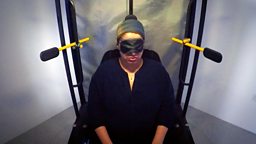What can I do about restless legs syndrome?
Restless legs syndrome (RLS) is the term given to an unusual condition where someone experiences an irresistible urge to move their legs, often accompanied by unpleasant feelings like a crawling sensation under the skin. It often comes on when people are resting – usually at night – and while walking can relieve it, the condition can disrupt sleep, bringing with it tiredness and irritability.

There’s some evidence that it can be relieved by drugs that boost the levels of a chemical in our brain called dopamine. Dopamine is associated with a number of things - it plays a key part in our reward-motivated behaviour, such as the rush of pleasure we get when we’ve eaten certain foods. However, it’s also thought to affect our movement.
The problem with taking dopamine-boosting drugs is that your body adapts to the new levels of dopamine – and within 2 years about a third of people on these drugs see their symptoms returning. If you are taking medication for restless legs syndrome then it’s worth bearing in mind that sometimes symptoms naturally disappear – so it might be an idea to take a break from treatment to see if the symptoms have stopped.
At least one study has connected RLS to low iron levels in the blood – this, it’s claimed, leads to low iron levels in the parts of our brain that control movement, which in turn causes the symptoms. The same report suggests this is why RLS is more common in pregnant women, who are often iron deficient; in fact about 1 in 5 pregnant women will experience RLS in the last 3 months of pregnancy. If you think you might be iron deficient, you should see your GP - iron supplements need to be prescribed by a doctor as it’s important to get the levels just right.
However, if the symptoms are mild enough, then you can try other things. First, try to get more exercise – there’s some evidence that it can help. Secondly, do everything you can to establish a good sleep routine – cut out caffeine and other stimulants late at night, and don’t stay up too late. If the symptoms persist beyond this and they’re really disturbing your sleep, it’s best to make an appointment with your doctor.





























